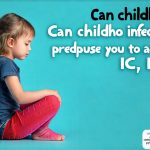Prostate health is often discussed in relation to aging and lifestyle factors, but the potential influence of events from much earlier in life – childhood illnesses – is a relatively underexplored area. While the direct link isn’t fully understood and research is ongoing, emerging evidence suggests that certain infections and immune responses during formative years could play a role in prostate development and subsequent health outcomes later in life. This exploration delves into the complex relationship between early-life experiences and adult prostate wellbeing, examining current understanding and potential avenues for future investigation.
The prostate gland undergoes significant developmental changes from fetal development through adolescence. Disruptions to this process, or alterations to the immune system during these critical periods, may have long-lasting effects on its structure and function. Understanding how childhood illnesses might contribute to these disruptions is essential for a more comprehensive approach to prostate health management and preventative care. This article will explore some of the theories and existing research exploring this fascinating intersection between early life events and adult health.
Childhood Immune Development & Prostate Health
The immune system isn’t fully developed at birth; it matures progressively throughout childhood, shaped by encounters with various pathogens. These early exposures “train” the immune system to differentiate between harmless substances and threats, establishing a foundation for lifelong immunity. However, the nature and timing of these exposures can profoundly impact its development, potentially influencing susceptibility to diseases later in life – including those affecting the prostate.
A dysregulated or improperly trained immune system could contribute to chronic inflammation, which is implicated in several prostate conditions. The interplay between early immune responses and subsequent prostate health remains a complex area requiring further investigation.
Potential Mechanisms Linking Childhood Illnesses & Prostate Issues
The connection between childhood illnesses and adult prostate health isn’t straightforward. Several potential mechanisms are being investigated by researchers. These include alterations to the microbiome, epigenetic changes, and impacts on hormonal regulation during critical developmental windows. The early life environment can significantly influence these processes.
Viral Infections & Inflammation
Certain viral infections common in childhood – such as measles, mumps, and even frequent respiratory syncytial virus (RSV) infections – have been theorized to potentially impact prostate health through chronic inflammation or alterations to immune function. While there’s no established causal link demonstrating these illnesses directly cause prostate issues, the inflammatory responses they trigger during development could theoretically contribute to later susceptibility. The idea is that repeated or severe viral loads may “overstimulate” the developing immune system, leading to a state of heightened reactivity and potentially contributing to chronic inflammation in adulthood.
The body’s response to these infections also matters; genetic predisposition plays a role in how strongly someone reacts to illness. This interaction between genetics and environmental factors is crucial for understanding individual risk profiles. It’s important to note that many individuals experience these common childhood illnesses without developing prostate problems, suggesting other factors are at play.
Autoimmunity & Prostate Development
The development of autoimmune responses – where the immune system mistakenly attacks healthy tissues – can be influenced by early-life events. Some research suggests that certain childhood infections might trigger or exacerbate autoimmune processes, potentially impacting prostate tissue over time. While this is a complex area and not directly linked to specific prostate conditions yet, it’s an emerging hypothesis being explored in immunological studies.
The prostate gland expresses molecules that can be targeted by the immune system during autoimmune responses. Early disruption of immune tolerance – the ability of the immune system to recognize self from non-self – could theoretically increase the risk of such attacks later in life. More research is needed to determine if this plays a significant role in prostate health outcomes, but it represents an intriguing avenue for investigation.
Gut Microbiome & Systemic Immunity
The gut microbiome—the community of microorganisms living in our digestive tract—plays a crucial role in shaping immune development. Early-life exposures, including infections and antibiotic use, can significantly alter the composition of this microbiome. These alterations are linked to changes in systemic immunity and inflammation levels.
A disrupted microbiome (“dysbiosis”) can lead to impaired immune function and increased susceptibility to chronic diseases. While research specifically linking childhood gut dysbiosis to prostate health is limited, there’s growing evidence suggesting a connection between the microbiome, inflammation, and various health conditions—including those affecting the prostate. This highlights the importance of supporting healthy gut microbial diversity in early life through factors like breastfeeding and minimizing unnecessary antibiotic use.
Ultimately, understanding the influence of childhood illnesses on adult prostate health requires more extensive research. It’s unlikely to be a simple cause-and-effect relationship; rather, it’s likely a complex interplay between genetics, environmental factors, immune development, and lifestyle choices. Focusing on preventative measures like promoting robust immune function in children through vaccination, healthy nutrition, and minimizing unnecessary antibiotic use may contribute to better long-term prostate health outcomes. Further research is essential to clarify these connections and develop targeted strategies for prevention and early intervention.





















